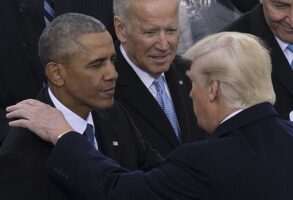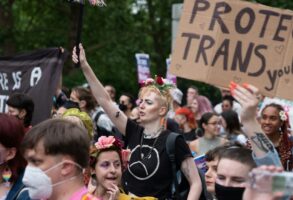Published December 11, 2013
This past July, I had the honor of giving the commencement address at the Ukrainian Catholic University in Lviv and spoke about the truths that make it possible to live freedom nobly. The day before, I had met with graduate students in a summer philosophy seminar for over two hours of intense discussion about the future of Western democracy. Little did I know that some of the students with whom I was discussing the democratic future — and the moral-cultural foundations necessary to sustain a free polity and a free economy — would be confronted with hard questions about the relationship between moral truth and public life just five months later, in a dramatic national upheaval that is being played out both in the streets of Kiev and in the consciences of individual Ukrainians.
For while there are many factors impelling Ukrainians into the streets these days, the most basic question at issue in the confrontation between the protesters and the government of Viktor Yanukovych is this: Will conscience, tethered to moral truth and ordered to the common good, be permitted a place in the Ukraine of the 21st century? Or is Ukraine condemned by history, by geography, and by the toxic aftereffects on its culture of seven decades of Communism to be an outlier or exile in the contemporary drama of freedom, governed by brute force detached from any notion of moral responsibility?
Ukrainians’ powerful demonstration of solidarity and self-sacrifice in recent days and weeks should bring a blush to the face of a West that has too often lived freedom as mere willfulness — economic willfulness, political willfulness, moral willfulness. Yet the Revolution of 1989 in Central and Eastern Europe, which created the political conditions for the successful assertion of Ukraine’s independence in 1991, was far less a revolution of will than it was a revolution of reason and conscience. During the 1970s and 1980s, individuals throughout the Warsaw Pact made the conscientious decision to “live in the truth,” to live “as if” they were free. Those conscientious decisions were informed by an idea of the human person: that men and women are not just bundles of desires demanding to be satisfied; that human beings are capable of insight, courage, fellow-feeling, self-command, and moral nobility. And from that idea came the remarkable civil-society institutions that laid the foundations for a democratic future: Charter 77, Solidarity, the Lithuanian Catholic Committee for the Defense of Believers’ Rights, and so many more.
Much of this has been forgotten, and that is a shame for both older democracies and new democracies. It is now often said that Communism failed simply because it could not compete economically in the world of the microprocessor and the fiber-optic cable. But that claim does an injustice to the historical record (Communist regimes had long tried to buy acquiescence to their monopoly of political power with consumer goods), and it demeans the sacrifices of the martyrs for freedom who literally gave their lives so that the human future would not be that imagined by George Orwell in 1984: a jackboot stamping on a face, forever.
The West may have thought that the dystopia of 1984 had been subtracted from the sum total of possible European futures by the collapse of the Soviet hegemony in Central and Eastern Europe and the subsequent collapse of the USSR itself. The brutality on the streets of Kiev is a stark reminder that the totalitarian temptation remains a real one when public authority is detached from public accountability, when the common good is ignored while unaccountable and powerful individuals live lives of decadence built on theft, and when the idea of “democracy” is reduced to an arithmetic exercise in vote-counting.
Ukraine’s drama reminds the entire Western world that it takes a certain kind of people, living certain virtues (certain habits of the heart and mind), to make freedom work, politically and economically, for the common good, the public good, not just for the aggrandizement of powerful individuals. Ukraine’s suffering at the hands of a thuggish government and its agents is a powerful reminder that freedom is never free. And that is why it is imperative that the West, led by the United States, support the demands for political and economic reform in Ukraine, and for the reform of Ukraine’s public culture, that are being pressed by those brave men and women who have challenged the power of the powerful with the power of truth.
This is not just a matter of “process,” any more than genuine democracy is a matter of “process” only. What is at stake in Ukraine in December 2013 are the very ideas about human dignity on which any genuinely free society rests — and that any truly free society is willing to defend.
— George Weigel is distinguished senior fellow of Washington’s Ethics and Public Policy Center where he holds the William E. Simon chair in Catholic Studies. He is a member of the board of directors of the U.S. National Endowment for Democracy. This was originally written for Ukrainska Pravda.








